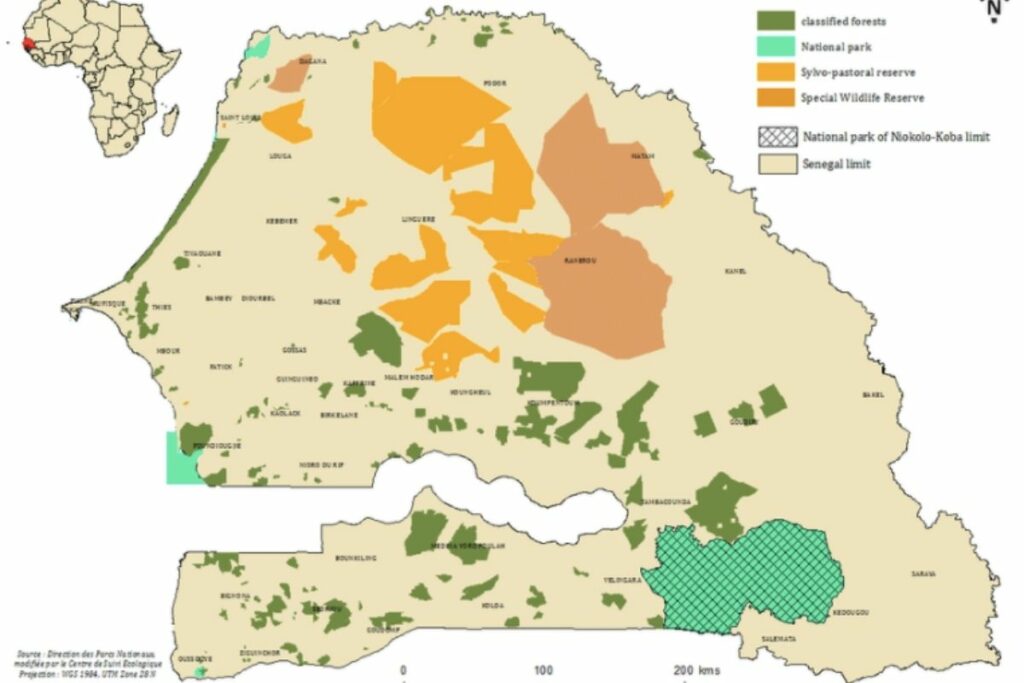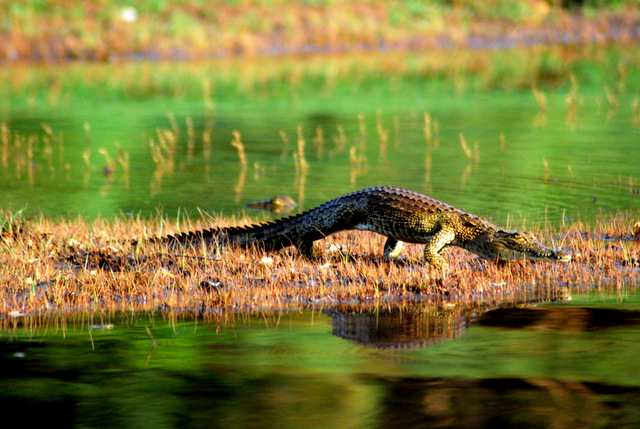The Niokolo-Koba National Park on the banks of the Gambia river is known for its wildlife. This includes elephants, lions, leopards, chimpanzees, baboons, hippopotamuses and the Western giant eland. Around 330 species of birds have been sighted in the park.
Most of the park consists of relatively flat woodland savannah and semi-arid Sudanese forest, with large areas of wooded wetlands and seasonal wetlands. The park contains over 1500 species of plants and 78% of the gallery forest in Senegal.
The site has been under threat for long from poaching and encroachment of human population and wandering livestock. Other threats are the proposed Sambangalou dam and a large basalt quarry. The numbers of large mammals have dropped to under 900 (UNESCO 2007).

Brief synthesis
Located in the Sudano-Guinean zone, Niokolo-Koba National Park is characterized by its group of ecosystems typical of this region, over an area of 913 000ha. Watered by large waterways (the Gambia, Sereko, Niokolo, Koulountou), it comprises gallery forests, savannah grass floodplains, ponds, dry forests — dense or with clearings — rocky slopes and hills and barren Bowés. This remarkable plant diversity justifies the presence of a rich fauna characterized by: the Derby Eland (the largest of African antelopes), chimpanzees, lions, leopards, a large population of elephants as well as many species of birds, reptiles and amphibians.
Criterion (x): Niokolo-Koba National Park contains all the unique ecosystems of the Sudanese bioclimatic zone such as major waterways (the Gambia, Sereko, Niokolo, Koulountou), gallery-forests, herbaceous savanna floodplains, ponds, dry forests — dense or with clearings– rocky slopes and hills and barren Bowés. The property has a remarkable diversity of wildlife, unique in the sub-region. It counts more than 70 species of mammals, 329 species of birds, 36 species of reptiles, 20 species of amphibians and a large number of invertebrates. Lions, reputedly the largest in Africa, are a special attraction, as well as the Derby Eland, the largest antelope in existence. Other important species are also present, such as the elephant, leopard, African wild dog and chimpanzee. The wealth of habitats should be noted, along with the diversity of flora, with over 1,500 important plant species.
Integrity
Covering nearly one million hectares, the Niokolo-Koba National Park is sufficiently vast as to illustrate the major aspects of the Guinean savanna-type ecosystem, and to ensure the survival of species therein. However, reports indicate a considerable poaching of elephants. The proposed dams on the Gambia and the Niokolo-Koba are also a concern because they would have disastrous consequences for the ecological integrity of the property.
Protection and management requirements
The park is managed by a management administration under the direct supervision of the State through the Ministry of Environment and Nature Protection and the National Parks Directorate. In 2002, a development and management plan was elaborated. This Plan should be updated through regular revisions to strengthen the conservation of the property, and provided with adequate resources to ensure its effective implementation.

The property, inscribed on the List of World Heritage in Danger in 2007, is subject to many pressures such as poaching, bush fires, the premature drying up of ponds and their invasion by plants. To this must be added population growth and poor soil in the surrounds, which has led to encroachment on agricultural land and livestock wandering in the park. The priorities for the protection and management of the property are thus to implement urgent measures to halt poaching, improve the park’s ecological monitoring programme, develop a plan for survival of endangered species, address premature drying up of the ponds and their invasion by plants or find alternative solutions, and minimize the illegal movement of livestock. It is also necessary to improve cross-border cooperation and measures to protect buffer zones and ecological corridors outside the park. For the long-term management, protection of the property should be a national policy, project and budgetary priority, with the assistance of development partners.
Photo Gallery http://whc.unesco.org/en/list/153/gallery/






